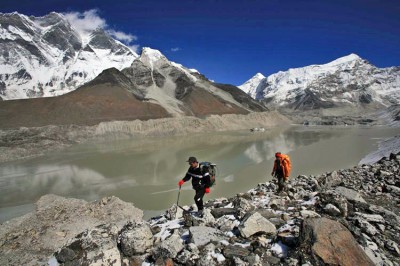Are we hard-wired to ignore problems till they happen? A “game theory” research project and a neurological study suggest we are. [8 November 2011 | Peter Boyer]
 Trouble is brewing in the Himalayas, in the form of 20,000 glacial lakes. Some are enlargements of old lakes, but most are just a few years or decades old. People have been watching them get bigger each year.
Trouble is brewing in the Himalayas, in the form of 20,000 glacial lakes. Some are enlargements of old lakes, but most are just a few years or decades old. People have been watching them get bigger each year.
With the roof of the world warming at a rate far above the global average, the Himalayan glaciers and icefields are melting, with all sorts of implications for people who live downstream.
One implication is long-term water supply for the vast numbers of people who live on the Yangtze, the Mekong, the Ganges, the Indus and the other mighty rivers whose year-round flow depends on glacial melt. It was this above all that led the Chinese and Indian governments to decide they had to have policies on climate change.
Glacial lakes are a somewhat more pressing issue. Water is accumulating at an ever-increasing rate behind unstable barriers of debris — rock, dirt, ice or a combination of these — which at any time could burst, with devastating results for the large numbers of people living in the valleys below.
Governments can do very little about this. The scale of the problem is much too large for those small countries most directly affected, Nepal and Bhutan. Dams can be breached in stages, or water pumped to lower levels, but at a cost in money and energy. And which of the lakes do you choose first?
The people in the valleys know the problem, but these valleys are their countries’ food-bowls, and there’s nowhere to go. So they do what humans have always done when faced with a big threat that they can do nothing about. They put it out of their minds and focus on the here and now.
It seems to me that the plight of the Himalayan valley people is a microcosm of humanity facing the vague and, to most people, invisible threat of greenhouse warming. Out of a motive of self-preservation, we declare to ourselves that “it’ll be all right” and get on with life.
Many years ago, as a cadet journalist, I had a mentor who was the newspaper’s music critic (in the days when we had such luxuries), a distinguished German gentleman named Karl Hubert. In one of our deep and meaningful conversations I expressed admiration for the ideas of Sigmund Freud.
I recall my surprise at his response, to the effect that Freud’s psychoanalysis was a mistaken path, because it wasn’t remembering past difficulties that brought people peace, but forgetting them.
Whether or not Dr Hubert was right about psychoanalysis, his thinking strikes a chord with several connected strands of current research into how people faced with challenges like climate change continue to be optimistic or complacent. Consider a couple of research papers published last month in Nature and Nature Neuroscience.
A study by Dominic Johnson (University of Edinburgh) and James Fowler (University of California San Diego) looked at over-confidence and under-confidence in people. It concluded that being confident is in evolutionary terms actually an advantage because you’re more likely to succeed than when you’re frightened or depressed. A reasonable conclusion, I’d have thought.
The second study, by scientists at the Wellcome Trust Centre for Neuroimaging at the University College London, showed that most people tend to be optimistic about the future, no matter how bad their circumstances, because they discard all information and experiences that don’t conform with their rose-tinted world view.
The study looked at the neurology of the optimistic state of mind, and concluded that in unwavering optimists, the brain’s frontal lobe is unable to accept or process unfavourable evidence.
Like Johnson and Fowler, the Wellcome researchers accept that optimism can be a good thing, lowering anxiety and stress, but in excess it can prevent people from taking precautions (like lowering carbon emissions) that threaten their future well-being or even survival.
In the study, people were asked to indicate how likely they were to contract certain diseases, and were then provided with information about the actual incidence of these diseases in the population and asked to adjust their estimate to take account of this.
Eighty per cent of people in the study sample did adjust their figures, but by a smaller amount than the statistical evidence suggested they should. In other words, people pick and choose the information they need to match how they currently view their prospects. So most of us are optimists, or perhaps all of us are most of the time.
Reacting to our inability to react promptly to the danger signals coming from data about emissions, temperature and the general state of the planet, many scientists and opinion leaders have expressed decidedly negative views about people — a position that I have shared from time to time.
But thinking about it further, I’m inclined to the view of Johnson and Fowler that we shouldn’t get too despondent about this, accepting that we’re hard-wired to be over-confident because over the ages we’ve more often than not gained an advantage from it.
As for myself, I hope I’m able to spot danger when it approaches, responding rationally and with appropriate dispatch, and adapting where necessary. For all that, I’m decidedly in the optimist camp.
While squarely facing our difficulties, we need to feel good about ourselves and our future. As the people of the Himalayas would say, a life lived in fear is no life at all.

